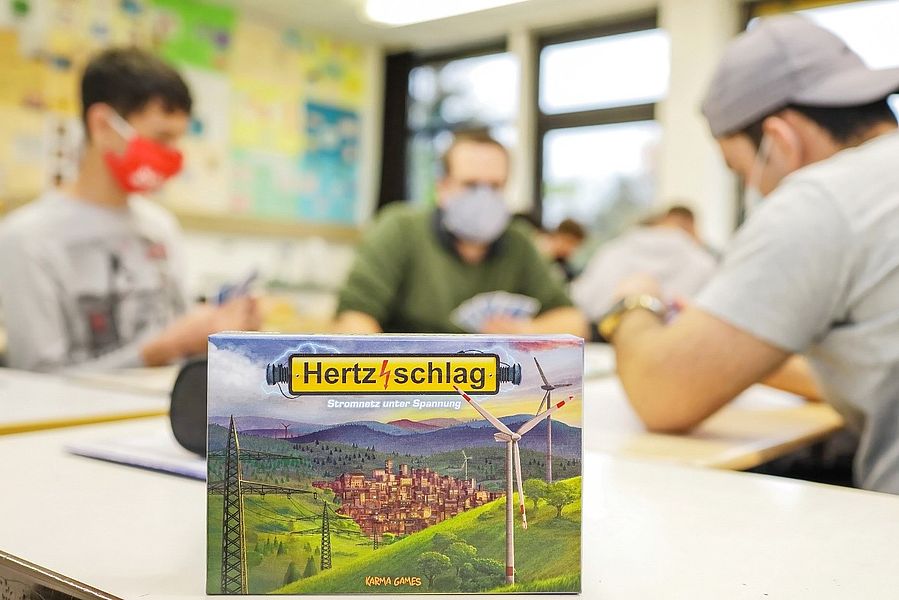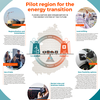Schools in Berlin receive free game and teaching materials to educate children about climate change
Berlin schoolchildren can now also engage with the energy transition in a playful way. For some weeks now, a board game called Hertzschlag (a word play bringing together the unit of frequency 'hertz' with the German for 'heartbeat') has been available. Jointly developed by pupils, teachers, power grid operator Stromnetz Berlin and game developer Karma Games, Hertzschlag is designed to bring together, in a fun format, addressing the need for education and transparency about the energy transition and sharing knowledge about relationships in the energy system, and this is reflected by the subtitle Haltet das Stromnetz unter Spannung ['Keep the grid energised']. The idea behind the game is to give pupils the chance to learn from personal experience and understand how the power grid is affected by, for example, the use of renewables, their own behaviour, energy efficiency and the political environment. This approach educates players about climate change and cultivates an understanding of technical and system-side challenges.
A total of 3,000 such games were produced in the first print run. Schools that are interested can now order the game and will then receive a classroom set consisting of five of these games as well as supplementary educational material to help teachers incorporate Hertzschlag into their lesson plans. These additional resources include the information brochure produced by Hagemann & Partner Bildungsmedien Verlag, worksheets and access to online exercises. The game is aimed at young people aged 12 and over and will be particularly useful for physics and geography lessons for pupils in years 10 to 13 of the German school system (i.e. aged 15+).
As in the power grid itself, balance is important!
Why an energy game? Thomas Schäfer, Managing Director at Stromnetz Berlin, explains: "As the operator of a city's distribution grid, our work on our systems largely goes on 'underground' and so we barely register with some sections of the public. This prompted the idea of developing a game that would make the esoteric world of the energy system a bit more visible, understandable and transparent. We now hope that Berlin schoolchildren will have a lot of fun, and we wish them luck, with both learning about the power grid in an innovative and interactive way by playing Hertzschlag and always striking the right balance in controlling the energy system."
Pupils from Elinor-Ostrom-Schule in Prenzlauer Berg and their teacher Sebastian Jungwirth helped to develop the idea for the game at a workshop, supported by project partner BAUM Consult, in January 2018. Sebastian has now been testing out the game in his current teaching role at Clay-Schule in Neukölln, saying: "Hertzschlag allows the children to engage with the energy transition in a really fun way. As they play, they learn what impact they themselves can have and how their actions affect the environment and the power grid. The game provides a different approach from 'conventional' forms of teaching, and I've noticed it has even engaged pupils who normally aren't interested in physics."
The game was developed as part of WindNODE, the SINTEG programme for Northeastern Germany funded by the Federal Ministry for Economic Affairs. Many studies show that large sections of the public do not feel properly informed about the energy transition. This is where Hertzschlag comes in, because power grids are a vital link in the energy transition and play a key role in the integration of both new energy generators, e.g. from the renewables segment, and new consumers such as those spawned by e-mobility.
Main features of Hertzschlag:
- The game is designed so that individual players can win points while striving towards a common goal.
- The objective of the game is to keep the energy system balanced at all times (i.e. at 50 hertz).
- If the system gets too far out of balance, everybody loses.
- The individual actions of every player affect the frequency and thus the balance. Events (weather, system disruptions, etc.) can also throw the system out of balance.
- The more weather-dependent, renewable energies are in play, the greater the impact of weather-related events. Flexibility options also become more important.
- Controllable generators and consumers help to restore balance.
- In addition, all players have an individual goal to optimise their energy mix and energy efficiency, with each player being assigned a 'secret target'. This allows players to win individually.
- Interactions between neighbouring players add even more fun to the game. Players can choose to respect their mutual deals – or not.




